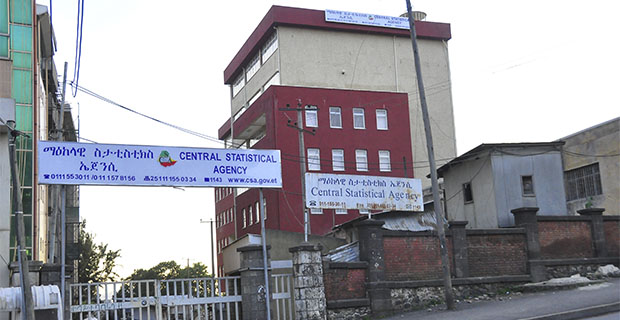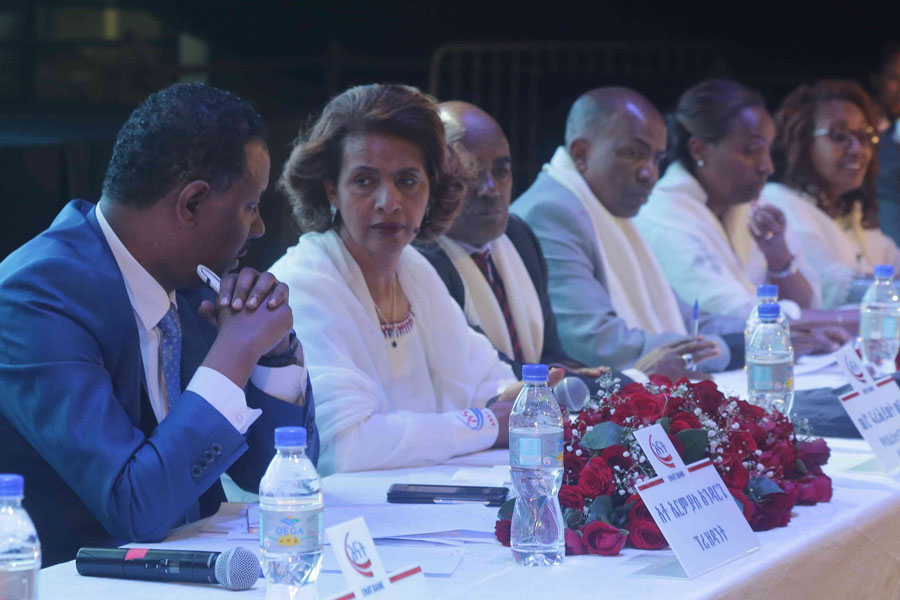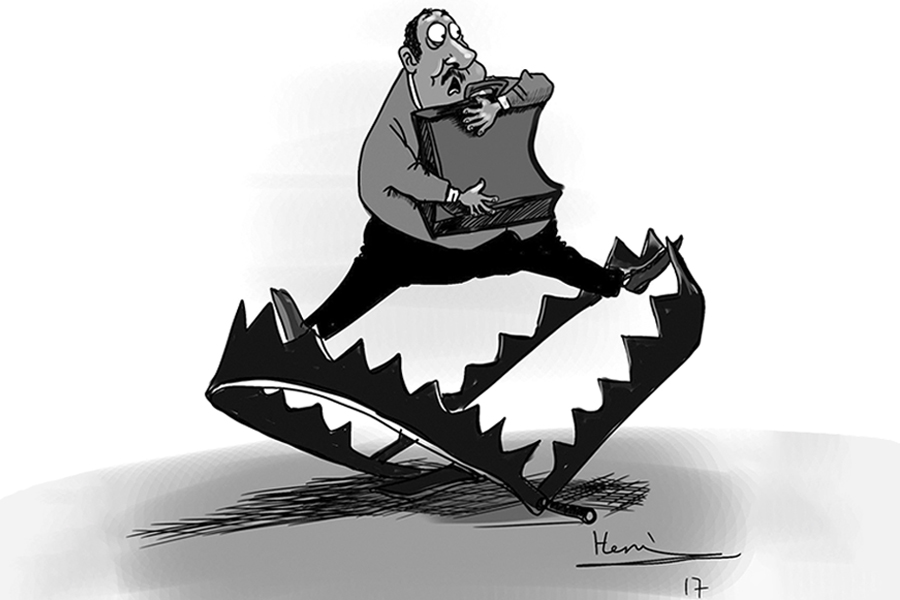
Fortune News | Dec 27,2018
May 11 , 2019
By Hiwot Gebremariam
Ethiopia’s constitution is by and large progressive, but it is not perfect. Amendments should be introduced, especially to clarify the boundary between group and individual rights, writes Hiwot Gebremariam (hiwot.gebremariam223@gmail.com), an economic development professional.
The Ethiopian Constitution was ratified in August 1995, establishing a federal and democratic state structure. Despite its immense significance, much as any other constitution around the world, it has nonetheless been written by humans with less than a perfect participatory method, thus subject to human errors and misinterpretation.
Beyond the will of the government, the laws of the land play a critical role in ensuring civic rights are fully respected. Conflicts around the world mostly emerge from the way written and spoken words are interpreted. Whether these words are referred to as sacred, mystical or just legal, their interpretation can determine an outcome of interactions.
Could there be cracks in our Constitution making it open for interpretation? Could certain amendments help alleviate the country’s problem, if not completely address it?
After all, even the United States’ Constitution, with full respect to the Founding Fathers, has added 27 amendments.
We should build on what exists. Advocating for a complete re-write of the Constitution and what the country has built thus far would only take the country backwards. While criticising some of the outcomes, we should give respect to Ethiopia’s men and women who have given their sweat, blood and lives to uphold the rights of the people and nations and nationalities of the country.
Nevertheless, it has been 23 years since the constitution has been written, and no amendment has been introduced to it yet.
Perhaps the most detrimental confusion that the constitution has is between the rights that groups and individuals. Balancing the rights of the people and the rights of the individual is a daunting exercise to any democratic system. This is where we can use clarification.
“Every Ethiopian national, without any discrimination based on colour, race, nation, nationality, sex, language, religion, political or other opinion or other status,” has the right “to vote and to be elected at periodic elections to any office at any level of government,” the constitution states under the article, “Right to Vote and to be Elected.”
Another article that states the “Rights of Nations, Nationalities, and Peoples” is seemingly contradictory.
“Every Nation, Nationality and People in Ethiopia has the right to a full measure of self-government, which includes the right to establish institutions of government in the territory that it inhabits and to equitable representation in state and Federal governments,” as the constitution puts it.
Then, can members of “Nations, Nationalities, and People” establish an “institution of government” exclusively based on lingo-cultural identification?
The constitution defines “Nations, Nationalities, and People” as “a group of people who have or share a large measure of a common culture or similar customs, mutual intelligibility of language, belief in a common or related identities, a common psychological make-up, and who inhabit an identifiable, predominantly contiguous territory.”
Not every “Ethiopian national” living in a contiguous territory shares an identity as defined in this section nonetheless. Ethiopia is a country of dozens of ethnicities which, although not all have yet acquired statehood rights, have been living peacefully together with other ethnicities as a community, scattered at times around the nation without having a predominantly contiguous territory. Such Ethiopian nationals should also have the right to exercise their full civic rights and actively participate in politics within the community they live in.
If an institution of government established by “Nations, Nationalities and People” is allowed to discriminate on membership and active political participation based on ethnic identity, then the institution is taking away the right of an Ethiopian who does not share the same “identity” but is a member of the community nonetheless. This would implicitly take away rights from being elected and representing the community through the established institution of government.
The “institution of government” thus would implicitly be forcing the Ethiopian national to go live in a territory where they have lingo-cultural alliances just to participate in politics and exercise full civic rights. This is what partly fuels the misunderstanding that a local institution of government should only represent the local lingo-cultural majority it has been elected by.
If the institution of government does not discriminate based on any basis except being a citizen of this country, then an Ethiopian living in the community should have the full right not only to vote for but also be elected and actively serve through the established institution of government. This is as long as that person is in agreement with the governance philosophy of that institution.
We should introduce an amendment to the Constitution that makes it explicitly clear that institutions cannot prohibit membership and discriminate against active participation based on lingo-cultural identification.
PUBLISHED ON
May 11,2019 [ VOL
20 , NO
993]


Fortune News | Dec 27,2018

Radar | Oct 03,2020

Viewpoints | Apr 15,2023

Fortune News | Apr 10,2023

Editorial | Oct 26,2024

Radar | Aug 08,2020

Commentaries | Jun 08,2019

Editorial | Apr 22,2023

View From Arada | Mar 19,2022

Viewpoints | Dec 10,2018

Photo Gallery | 178656 Views | May 06,2019

Photo Gallery | 168850 Views | Apr 26,2019

Photo Gallery | 159685 Views | Oct 06,2021

My Opinion | 137093 Views | Aug 14,2021
Commentaries | Oct 25,2025

Dec 22 , 2024 . By TIZITA SHEWAFERAW
Charged with transforming colossal state-owned enterprises into modern and competitiv...

Aug 18 , 2024 . By AKSAH ITALO
Although predictable Yonas Zerihun's job in the ride-hailing service is not immune to...

Jul 28 , 2024 . By TIZITA SHEWAFERAW
Unhabitual, perhaps too many, Samuel Gebreyohannes, 38, used to occasionally enjoy a couple of beers at breakfast. However, he recently swit...

Jul 13 , 2024 . By AKSAH ITALO
Investors who rely on tractors, trucks, and field vehicles for commuting, transporting commodities, and f...

Oct 25 , 2025
The regulatory machinery is on overdrive. In only two years, no fewer than 35 new pro...

Oct 18 , 2025
The political establishment, notably the ruling party and its top brass, has become p...

Oct 11 , 2025
Ladislas Farago, a roving Associated Press (AP) correspondent, arrived in Ethiopia in...

Oct 4 , 2025
Eyob Tekalegn (PhD) had been in the Governor's chair for only weeks when, on Septembe...

Oct 25 , 2025 . By YITBAREK GETACHEW
Officials of the Addis Abeba's Education Bureau have embarked on an ambitious experim...

Oct 26 , 2025 . By YITBAREK GETACHEW
The federal government is making a landmark shift in its investment incentive regime...

Oct 29 , 2025 . By NAHOM AYELE
The National Bank of Ethiopia (NBE) is preparing to issue a directive that will funda...

Oct 26 , 2025 . By SURAFEL MULUGETA
A community of booksellers shadowing the Ethiopian National Theatre has been jolted b...